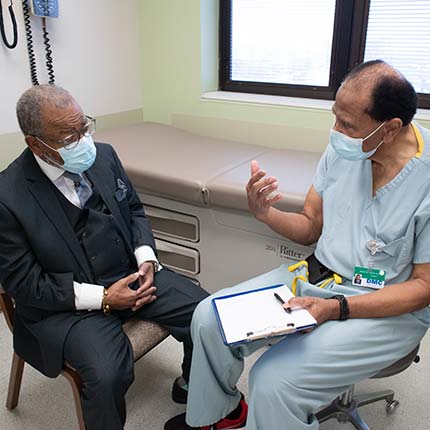Criteria for Bariatric Surgery
You've Struggled with Obesity for A Long Time
Weight loss surgery is designed for people who have been overweight or obese for years. In many cases, bariatric surgery patients have spent their entire adult life dealing with excess pounds.
You Have a Body Mass Index Over 40 (or 35+ with Co-Morbid Conditions)
One significant criteria for bariatric surgery is a high body mass index, or BMI. Generally speaking, you need to have a BMI of 40 or higher to be considered for weight loss surgery like gastric bypass, while a BMI of 30 or greater is needed to qualify
for procedures like the gastric band.
It's important to note that patients who have a BMI between 35 and 40 along with one or more comorbid conditions (conditions related to being overweight or obese) may also meet the criteria for bariatric surgery. Examples of obesity-related comorbid conditions
include type 2 diabetes, high blood pressure (hypertension), obstructive sleep apnea, or heart disease.
Your Previous Attempts to Lose Weight May Have Been Unsuccessful
One qualifier for bariatric surgery is being able to show an inability to achieve and maintain a healthy body weight, even if you've followed one or more medically-supervised weight loss programs for an extended period.
You're Prepared to Change Your Diet
Weight loss surgery is designed to help obese individuals lose weight by significantly reducing the capacity of the stomach (and therefore, cutting the number of calories that the patient can consume) and/or reducing the amount of nutrients, carbohydrates,
and sugars from the food the patient eats.
If you have bariatric surgery, you'll need to follow special dietary guidelines and maintain this modified diet for the rest of your life. Otherwise, you may wind up dealing with serious post-surgical complications or regain unwanted weight.
Our registered dietitians are available to help our patients plan healthy, enjoyable meals designed to promote long-term wellness.
You're Committed to Being Active
Regular exercise is an important part of post-surgical care for bariatric patients. Working out and staying physically active can help with the management of comorbid conditions like diabetes, improve mental wellness, and minimize the chances of complications
following weight loss surgery.
Your Mental Health Is Well Managed
Patients seeking bariatric surgery must understand that several factors may have contributed to their ongoing struggles with weight. Factors affecting obesity include medical issues, dietary habits, and mental health conditions such as depression, anxiety,
and eating disorders.
To meet the criteria for bariatric surgery, you may be asked to participate in a psychological assessment. If necessary, you may undergo treatment for conditions that could interfere as you cope with changes to your body after bariatric surgery.
Life After Surgery
Weight loss surgery is a highly effective way to lose weight, but it still comes with its ups and downs. Undergoing a surgical procedure designed to change the look and feel of your body is significant. There are many changes that may affect you as you
recover. Below is information you need to know about life after bariatric surgery.
Recovery
The recovery process begins immediately and can last from four to six weeks after your procedure, depending on the type of surgery. Most patients stay in the hospital one or two days after a procedure and remain home for three to four weeks before returning
to work or other regular activities. Many patients are not cleared to participate in a full exercise program for four to six weeks. Pain levels differ, but most patients are able to stay comfortable with prescription and over-the-counter pain medications.
Weight Loss
Weight loss varies greatly, but most patients begin to start losing weight immediately following surgery. In the first three months, patients will lose approximately 20 to 30 percent of excess weight, and 60 percent in the first six months to two
years. In order to maintain weight loss, a proper diet and regular exercise are required.
Diet
After bariatric surgery, dietary habits must be changed permanently. Patients are urged to maintain high protein, low carb diets with restricted use of sugar or alcohol. Some procedures, especially those that affect nutrient absorption, may require
extensive use of vitamins and supplements. Patients are encouraged to eat slowly, take small bites, and chew food thoroughly. Beverages should not be consumed with food.
Relationships
Bariatric surgery affects more than just your physical appearance. Losing extreme amounts of weight can be both emotionally and physically overwhelming. This may extend to personal relationships. Patients are encouraged to seek counseling and help
from support groups in order to ensure the physical changes of weight loss do not interfere with your interpersonal connections.
Returning to Daily Life
Recovery is an individual process, so resuming normal activity likely will not happen on the same timeline for everyone. Most patients are able to return to work or school within three to four weeks without prolonged discomfort. Those who have had
minimally invasive procedures may recover faster.
Birth Control and Pregnancy
Pregnancy is possible after bariatric surgery. Due to the hormonal changes following surgery, patients are encouraged to use an effective form of birth control for the first 12 to 18 months, even if conception was not possible before a bariatric procedure.
Patients are encouraged to wait at least two years before trying to conceive.
Support Groups
Support groups can be an excellent way to help patients recover emotionally after bariatric surgery. By creating an environment that encourages sharing and peer support, our patients are able to move forward with confidence. With active support groups
in place to assist you with short-term and long-term questions and needs, we’re able to offer the ongoing post-surgical support you deserve.



